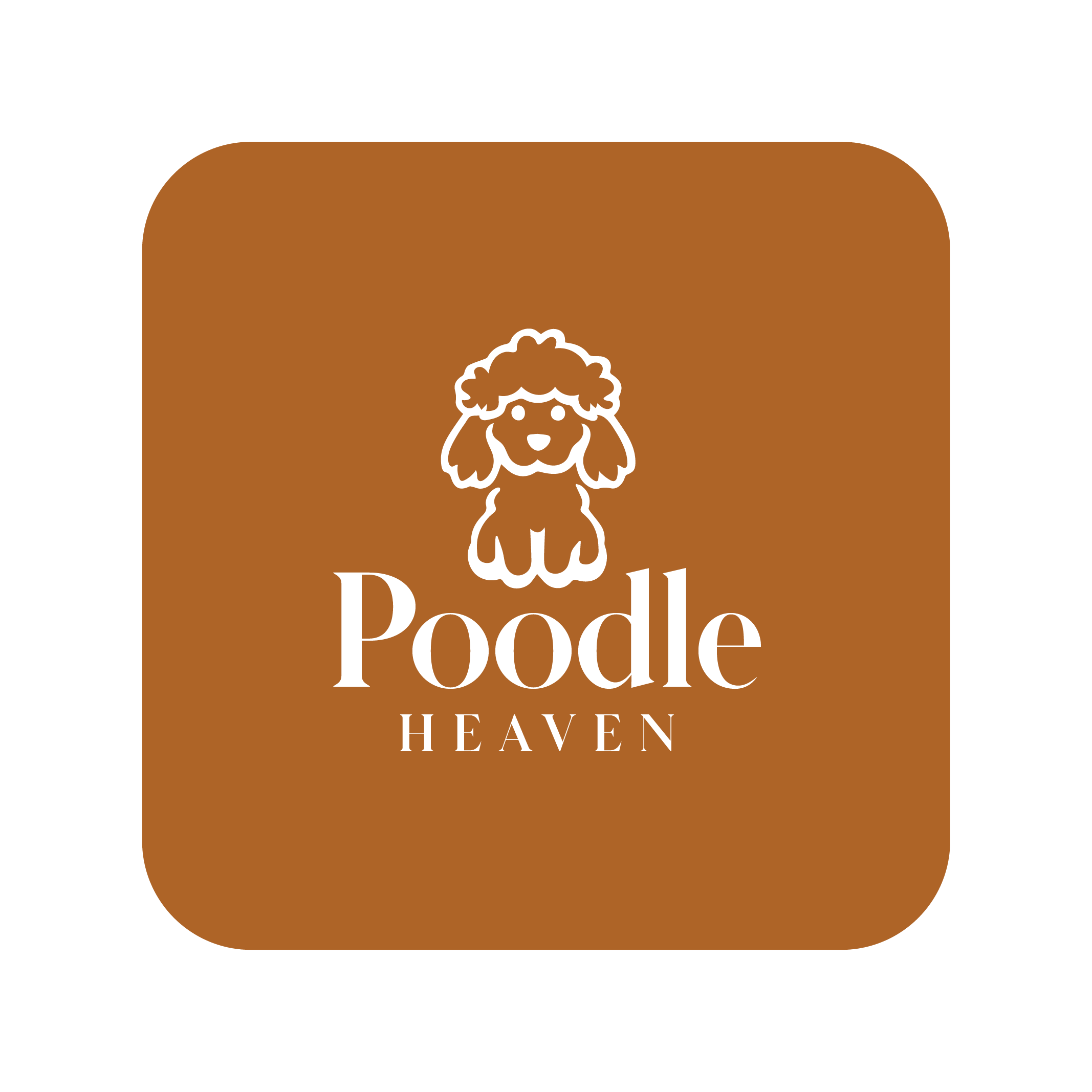Introduction
Poodles are among the most intelligent, versatile, and beloved dog breeds worldwide. They excel as companions for families, singles, and seniors and are known for their curly coats and sharp minds. What many people don’t realize is that Poodles come in various sizes and types, each with unique traits. Whether you’re looking for a large, energetic dog for outdoor adventures or a small, affectionate companion for apartment living, there’s a Poodle type for everyone.
In this guide, we’ll explore the different types of Poodles, including their sizes, temperaments, and health concerns. We’ll also dive into popular Poodle mixes, grooming needs, and how to choose the right Poodle for your lifestyle. By the end, you’ll have all the information you need to decide which Poodle type is perfect for you.
Standard Poodles
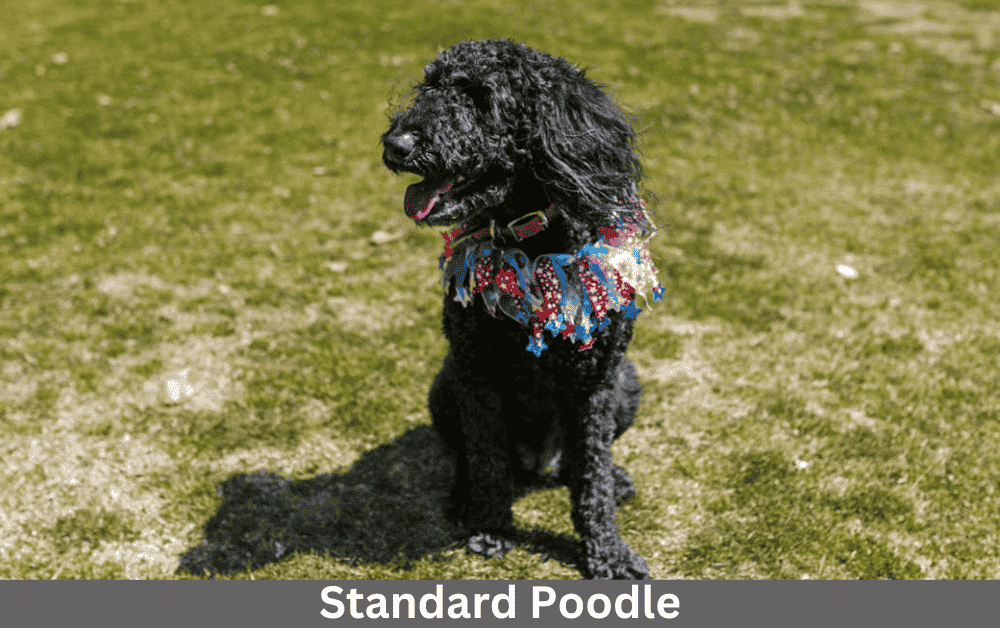
The Standard Poodle is the largest of the three Poodle varieties. They stand over 15 inches tall and weigh between 40 and 70 pounds, as mentioned by the American Kennel Club (AKC). These dogs are very smart, full of energy, and ideal for active families who love spending time outdoors. Standard Poodle dogs do exceptionally well in activities like agility training, therapy work, and water retrieval because of their athletic bodies and friendly, eager-to-please nature. Their curly, hypoallergenic coat also makes them a great choice for people with allergies.
However, Standard Poodle puppies can face health issues like hip dysplasia and bloat, as highlighted by AKC and PetMD. To keep them healthy, owners should take them for regular vet check-ups, feed them a balanced diet, and ensure they get enough exercise. These dogs need both mental stimulation and physical activity, so daily walks, playtime, and training sessions are important. With proper care, Standard Poodle dogs can live long, happy lives, often reaching 12 to 15 years of age. Their loyalty, intelligence, and playful nature make them one of the most popular dog breeds worldwide.
One Standard Poodle owner shared, “My dog loves hiking and swimming. He’s always full of energy, but he’s also very gentle with my kids.”
Miniature Poodles
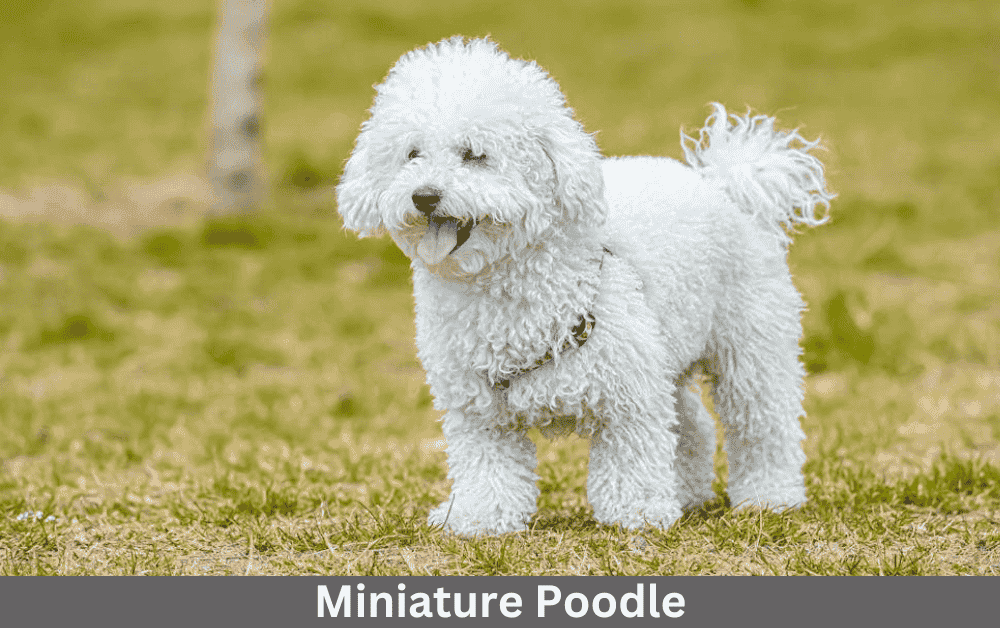
Miniature Poodles are smaller than Standard Poodles, standing between 10 and 15 inches tall and weighing 10 to 15 pounds. These dogs are very intelligent, adaptable, and great for people living in apartments or seniors who want a loyal companion. Miniature Poodle dogs love mental challenges and enjoy activities like solving puzzle toys, learning obedience commands, and playing agility games. Their small size and friendly nature make them easy to manage and perfect for indoor living.
Like many small breeds, Miniature Poodle puppies can face health problems such as eye issues and luxating patella, a condition where the knee joint slips out of place. To keep them healthy and happy, owners should groom them regularly, as their curly coats can get tangled, and ensure they get daily exercise. A short walk or playtime indoors can keep them active and fit. With proper care, Miniature Poodles can live long, joyful lives, often reaching 12 to 15 years of age. For more information, you can check trusted sources like the American Kennel Club (AKC) or PetMD.
A Miniature Poodle dog owner once said, “My dog is so clever! He learns tricks faster than any dog I’ve ever had.”
Toy Poodles
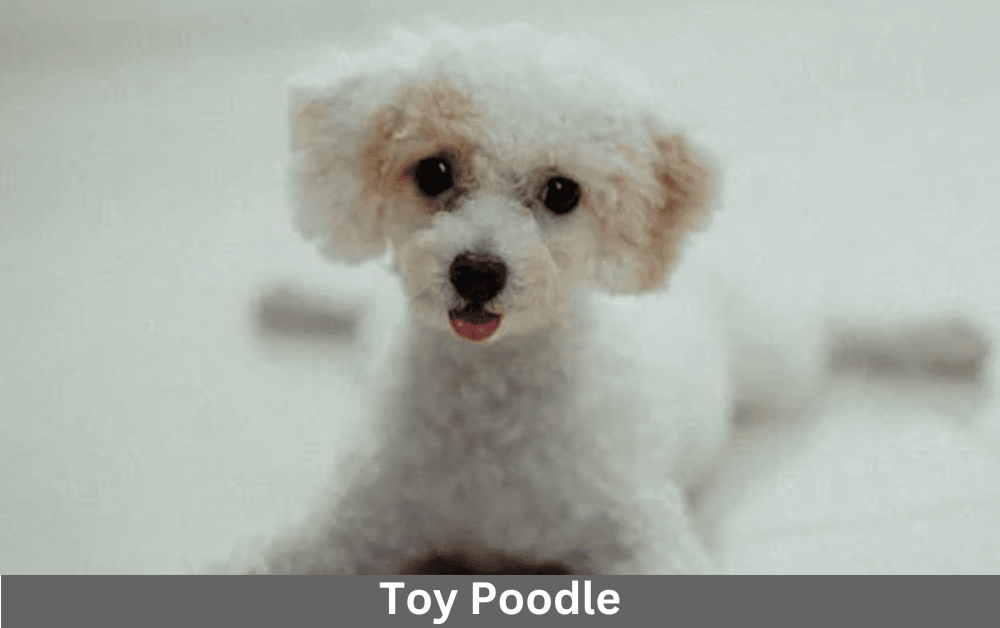
The Toy Poodle is the smallest of the three officially recognized Poodle types, standing under 10 inches tall and weighing only 4 to 6 pounds, as noted by the American Kennel Club (AKC). These tiny dogs are playful, affectionate, and perfect for people living in small spaces like apartments. Despite their small size, Toy Poodles are full of energy and love being around their families. They enjoy activities like short walks, indoor playtime, and learning new tricks.
However, Toy Poodle dogs can be sensitive and need gentle handling, especially around children. They are also prone to health issues like dental problems and fragile bones, according to AKC. To keep them healthy, owners should schedule regular vet check-ups, brush their teeth regularly, and handle them carefully. Daily exercise and mental stimulation, such as puzzle toys or training sessions, are important to keep them happy and engaged.
With proper care, Toy Poodle puppies can live long, joyful lives, often reaching 12 to 15 years of age. Their charming personality and adaptability make them a favorite among dog lovers. One Toy Poodle owner mentioned, “My little Poodle is like a shadow—she follows me everywhere and loves cuddling on the couch.”
Comparison of Standard, Miniature, and Toy Poodles
| Attribute | Standard Poodle | Miniature Poodle | Toy Poodle |
| Height | At least 15 inches | 10–15 inches | No taller than 10 inches |
| Weight | 40–70 pounds | 10–15 pounds | 4–6 pounds |
| Energy Level | High; enjoys vigorous activities like swimming, dock diving, and agility | Moderate; enjoys activities like hiking and kayaking | Moderate; enjoys short walks and interactive games |
| Temperament | Friendly, outgoing, and intelligent | Intelligent, friendly, and people-pleasing | Intelligent, trainable, and affectionate |
| Coat | Curly, stylish, requires regular grooming | Curly requires regular grooming | Curly requires regular grooming |
| Health Concerns | Hip dysplasia, PRA, bloat | Hip dysplasia, patellar luxation, PRA, cataracts | Patellar luxation, dental problems, PRA, cataracts |
| Hypoallergenic | Low-shedding and hypoallergenic | Low-shedding and hypoallergenic | Low-shedding and hypoallergenic |
| Companion Role | Great family pets; active and sociable | A perfect mix of size, charm, and adaptability | Excellent cuddle companions for families and seniors |
| Popularity | Recognized for their athleticism and charm | Ranked sixth most popular breed in the U.S. | Cherished for their lineage to the French aristocracy |
| Ideal Activities | Dog sports, swimming, track | Hiking, kayaking, lounging | Short walks, interactive games |
Klein (Moyen) Poodle
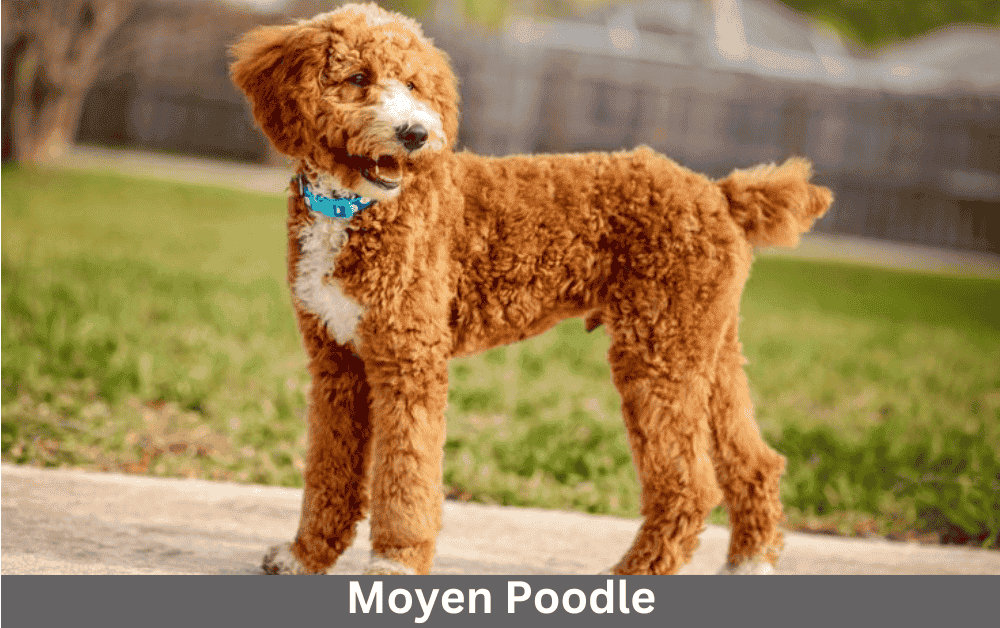
The Klein Poodle, also known as the Moyen Poodle, is a medium-sized Poodle that stands between 15 and 20 inches tall. This size falls between the Miniature and Standard Poodles and is quite popular in Europe, though it’s not officially recognized in the U.S.
Moyen Poodles are known for their balanced temperament—they’re energetic but not overly so, making them a great choice for families who want a dog that’s not too big or too small.
One owner shared, “Our Klein Poodle is the perfect size for our family. She’s playful but also loves to relax with us in the evenings.”
Teacup Poodle (Controversial)

Teacup Poodles are even smaller than Toy Poodles, standing under 9 inches tall and weighing just 5 to 7 pounds. These tiny dogs are bred for their extra-small size, but this comes with significant health risks.
Teacup Poodles are prone to fragile bones, heart problems, and other health issues due to their small size. Many veterinarians and breeders advise against buying Teacup Poodles because of these concerns.
As one vet explained, “Teacup breeds often face lifelong health challenges, and it’s important to prioritize the dog’s well-being over its size.”
Rare Poodle Colors & Coat Types
While most Poodles come in standard colors like white poodles, cream poodles, black poodles, apricot poodles, brown poodles, gray poodles, and silver poodles, some rare colors include phantom poodles, merle poodles, parti poodles, and brindle poodles. These unique colors make these Poodles stand out, but they often come with higher price tags.
Poodle coats can also vary. Most have curly coats, but some have corded coats, which form long, rope-like strands.
One owner of a rare-colored Poodle said, “My merle Poodle gets so much attention at the park. Her coat is truly one-of-a-kind!”
Popular Poodle Mixes (Doodles)
Poodle mixes, often called “Doodles,” have become incredibly popular due to their hypoallergenic coats and friendly personalities. Here are some of the most loved Poodle mixes:
- Labradoodle (Labrador mix): Known for being great with families, Labradoodles are energetic and love to play.
- Goldendoodle (Golden Retriever mix): These dogs are friendly, affectionate, and perfect for households with children.
- Cockapoo (Cocker Spaniel mix): Small and playful, Cockapoos are ideal for apartment living.
- Bernedoodle (Bernese Mountain Dog mix): Big and fluffy, Bernedoodles are gentle giants who love to cuddle.
Temperament of Poodles
Poodles are consistently ranked as one of the smartest dog breeds. Their intelligence makes them easy to train, and they excel in obedience, agility, and even dog sports.
The temperament of Poodles varies slightly by size:
- Standard Poodles: Confident, outgoing, and great for active families.
- Miniature Poodles: Adaptable, social, and perfect for apartment living.
- Toy Poodles: Affectionate and playful, but can be sensitive.
As one trainer noted, “Poodles are quick learners, but they also need mental stimulation to stay happy.”
Poodle Training & Exercise Needs
Poodles are highly intelligent and active dogs, so they require regular exercise and mental stimulation to stay happy and healthy. The exercise and training needs vary depending on the size of the Poodle.
Standard Poodles are the most energetic of the three types. They need daily walks, runs, or playtime to burn off their energy. They also excel in agility training and dog sports, making them a great choice for active families. Miniature Poodles are slightly less demanding but still require regular exercise. They love obedience training, agility games, and puzzle toys that challenge their minds. Toy Poodles, being the smallest, need less physical exercise but still enjoy short walks and indoor play. They thrive on interactive toys and gentle training sessions.
Key Points:
- Standard Poodles: Daily walks, runs, or playtime; excels in agility training.
- Miniature Poodles: Regular exercise, obedience training, and mental challenges.
- Toy Poodles: Short walks, indoor play, and interactive toys.
Are Poodles Hypoallergenic?
Poodles are often marketed a hypoallergenic dogs, but it’s important to understand what this means. While no dog is 100% hypoallergenic, Poodles produce less dander than many other breeds, making them a better choice for people with allergies. Their curly coats trap dander and loose hair, reducing the amount that gets released into the air.
However, maintaining a hypoallergenic environment requires regular grooming. Poodles need to be brushed 2–3 times a week to prevent matting and bathed every 4–6 weeks to keep their coats clean. Regular trimming is also necessary to maintain a manageable coat length.
Key Points:
- Poodles produce less dander but are not 100% hypoallergenic.
- Regular grooming is essential to reduce allergens.
- Brush 2–3 times a week, bathe every 4–6 weeks, and trim regularly.
Poodle Lifespan & Health
Poodles are generally healthy dogs, but each type has specific health concerns that owners should be aware of. Standard Poodles have a lifespan of 10–14 years and are prone to hip dysplasia and bloat. Miniature Poodles live slightly longer, averaging 13–16 years, but they are more susceptible to eye issues and luxating patella (a knee condition). Toy Poodles have the longest lifespan at 14–18 years but are prone to dental problems and fragile bones.
To ensure your Poodle stays healthy, it’s important to choose a responsible breeder who provides health clearances for the puppy’s parents. Regular vet check-ups, a balanced diet, and proper grooming can also help prevent many health issues.
Key Points:
- Standard Poodles: 10–14 years; prone to hip dysplasia and bloat.
- Miniature Poodles: 13–16 years; prone to eye issues and luxating patella.
- Toy Poodles: 14–18 years; prone to dental problems and fragile bones.
- Choose a responsible breeder and schedule regular vet visits.
A breeder advised, “Always ask for health clearances and meet the puppy’s parents before making a decision.”
How to Choose the Right Poodle for Your Lifestyle?
Choosing the right Poodle depends on your lifestyle, living situation, and preferences. Standard Poodles are ideal for active families who enjoy outdoor activities and have space for a larger dog. Miniature Poodles are a great choice for apartment dwellers or seniors because of their smaller size and adaptability. Toy Poodles are perfect for single owners or those living in small spaces, as they require less exercise and are easy to manage.
When selecting a Poodle, consider factors like energy levels, size, and maintenance needs. It’s also important to spend time with the dog before bringing them home to ensure they’re a good fit for your family.
Key Points:
- Standard Poodles: Best for active families with space.
- Miniature Poodles: Great for apartments or seniors.
- Toy Poodles: Ideal for small spaces or single owners.
- Consider energy levels, size, and maintenance needs.
How much does it cost to have a poodle?
Owning a Poodle comes with both initial and ongoing costs. The price of a Poodle puppy varies by type, with Standard Poodles costing $1,500 to $4,000, Miniature Poodles $1,200 to $3,000, and Toy Poodles $1,000 to $2,500. Yearly expenses include vet care ($300 to $600), grooming ($500 to $1,000), and food ($200 to $400).
It’s also important to budget for unexpected costs, such as emergency vet visits or additional training. While Poodles can be expensive to own, their loyalty, intelligence, and companionship make them worth the investment.
Key Points:
- Puppy Cost: Standard ($1,500 to $4,000), Miniature ($1,200 to $3,000), Toy ($1,000 to $2,500).
- Yearly Expenses: Vet care ($300 to $600), grooming ($500 to $1,000), food ($200 to $400).
- Budget for unexpected costs like emergencies or training.
Conclusion
Poodles are incredible dogs that come in various sizes and types to suit different lifestyles. Whether you choose a Standard, Miniature, Toy, or Doodle mix, you’re sure to find a loyal and loving companion. Take your time to research and choose the right Poodle for your needs. Consider factors like energy levels, size, and maintenance requirements to ensure a perfect match. And don’t forget to share which Poodle type you love the most in the comments!
FAQs about poodles
Which Size Poodle Lives the Longest?
Among the world’s most popular dog breeds, the Toy Poodle stands out for its compact size, charming personality, and impressive lifespan. These purebred dogs often live up to 12 to 18 years with proper care. While they may face some inheritable health problems, addressing their specific needs can help them live even longer.
Which Poodle is Right for New Owners/Homes?
Miniature Poodles share many traits with Standard Poodles, including intelligence, trainability, and friendliness. Their balanced temperament and manageable size make them a great fit for families and ideal for apartment living. Mini Poodles bring elegance and adaptability to any home.
What Are Poodle’s Weaknesses?
Poodles can be hypersensitive to their environment, reacting strongly to loud noises or sudden yelling. They may startle easily, especially in chaotic homes, which can lead to stress and upsetting behaviors. Sometimes, this stress causes gastrointestinal issues or neurotic responses. These traits highlight their need for calm surroundings and gentle handling to avoid such issues.
Are Poodles Good with Kids?
Yes, Poodles are generally great with kids, especially Standard and Miniature Poodles. Their friendly and playful nature makes them excellent companions for children. However, Toy Poodles, due to their small size, may be better suited for families with older kids who can handle them gently.
How Often Should You Groom a Poodle?
Poodles require regular grooming to keep their curly coats healthy and tangle-free. Brush their coat 2–3 times a week, bathe them every 4–6 weeks, and trim their hair every 6–8 weeks. Regular grooming also helps reduce allergens, making them a better choice for allergy sufferers.
Do Poodles Bark a Lot?
Poodles can be vocal and may bark to alert their owners or express excitement. However, proper training can help manage excessive barking. Miniature and Toy Poodles tend to bark more than Standard Poodles, but early socialization and consistent training can address this behavior.
